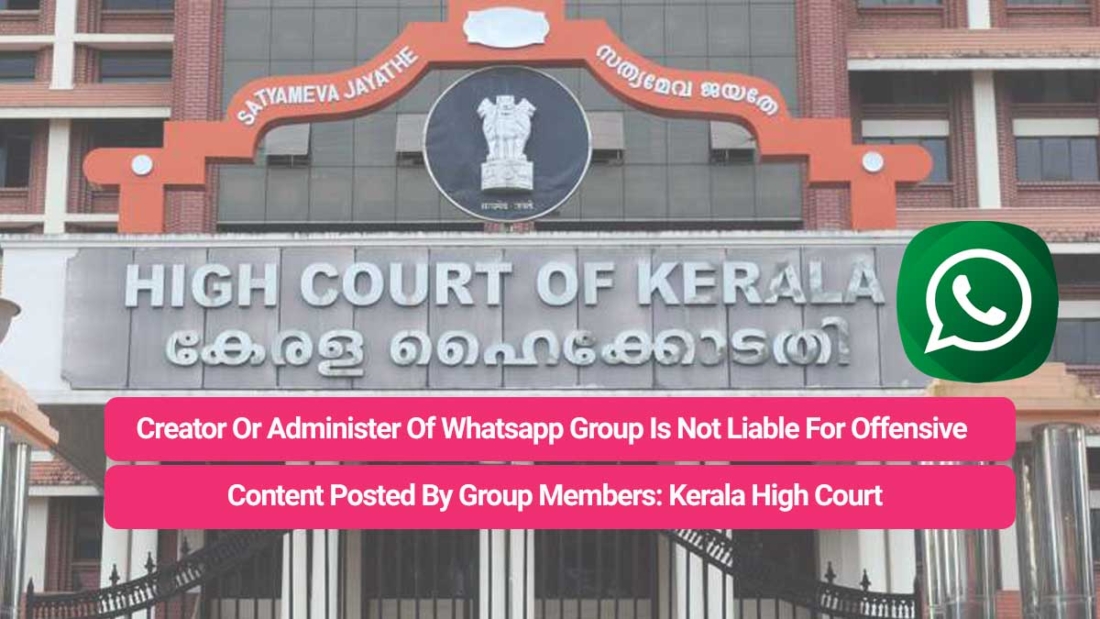A Petition was filed under Sec-482 of CrPC by petitioner in the Kerala high court for quashing the proceedings against him for being an accused for committing offences under Information Technology (IT) Act, 2000 and Protection of Children from Sexual Offence (POCSO) Act, 2012.
Brief Facts of the Case:
- The petitioner created a WhatsApp group by name FRIENDS and was the admin of that group. There were two more admins in the group.
- One of the other admins (who was accused no.1 in the case) posted a pornography depicting children engaged in sexually explicit act, on the group.
- The Ernakulam city police registered crime against the accused no.1 for the offences under Sec-67B(a), (b), (c) of the IT Act, 2000 and Sec-13, Sec-14 and Sec-15 of the POCSO Act,2012.
- The petitioner was arrayed as accused no.2 in the case for being the admin of the group.
- It was in these circumstances; this petition was filed under Sec-482 CrPC to quash the further proceedings against the petitioner.
Observation of the Court:
- After hearing the learned Counsel from both the parties, Court considered the main issue that was in question was that “Whether the petitioner could be vicariously held liable for the act of the accused no.1?”. Court referred to several cases to understand the issue o criminal vicarious liability.
- In the case of Sham Sunder vs. State of Haryana [(1989) 4 SCC 630], where the Apex Court held that, “9. But we are concerned with a criminal liability under penal provision and not a civil liability. The penal provision must be strictly construed in the first place. Secondly, there is no vicarious liability in criminal law unless the statute takes that also within its fold. Section 10 does not provide for such liability. It does not make all the partners liable for the offence whether they do business or not.”
- In the case Hira Lal Hari Lal Bhagwati vs. CBI, New Delhi [(2003) 5 SCC 257], it was held that, “30. In our view, under the penal law, there is no concept of vicarious liability unless the said statute covers the same within its ambit. In the instant case, the -said law which prevails in the field i.e. the Customs Act, 1962 the appellants have been thereinunder wholly discharged and the GCS granted immunity from prosecution.”
- Thus, with regard to vicarious criminal liability, Court reached to a conclusion that, in the absence of a special penal law creating vicarious liability, an admin of a WhatsApp group cannot be held liable for the objectionable post by a group member. Court said that petitioner cannot be charged under Sec-67B (a), (b), (d) of the IT Act and Sec-13, Sec-14 and Sec-15 of the POCSO Act as none of these provisions provide for such liability and there is no law by which an Admin of any messaging service can be held liable for a post made by a member in the group.
- In Kishor Chintaman Tarone v. State of Maharashtra & Another (2021 ICO 1285), the High Court of Bombay dealt with similar issue, it was held that a Group Administrator cannot be held vicariously liable for an act of a member of the Group, who posts objectionable content, unless it is shown that there was common intention or pre-arranged plan acting in concert pursuant to such plan by such member of a WhatsApp Group and the Administrator.
- In another case of Ashish Bhalla vs. Suresh Chawdhary & ors. (2016 SCC OnLine Del 6329), the Delhi High Court observed that defamation and defamatory statements made by any member of the group cannot make the admin liable for that. Court did not find any specific allegations in the facts, as to how and on what basis the petitioner committed the alleged offences.
- Lastly, referring to charges under Sec-67(a), (b), (c) of the IT Act, Court said that there was nothing on record suggested that the petitioner published or transmitted any electronic form of obscene material facilitated abusing children online. Similarly, the prosecution has no case that the petitioner used any child pornographic material in order to attract Sec-13, Sec-14 and Sec-15 of the POCSO Act.
In that view, Court ordered that the entire proceedings at the Additional Sessions (Cases relating to Atrocities and Sexual violence against women and children) Court, Ernakulam was quashed and the petition filed by the petitioner was stand allowed.
Vaishali Jain, Advocate & Associate – Child Safety at Work & Riddhima Khanna
 Cart is empty
Cart is empty 

